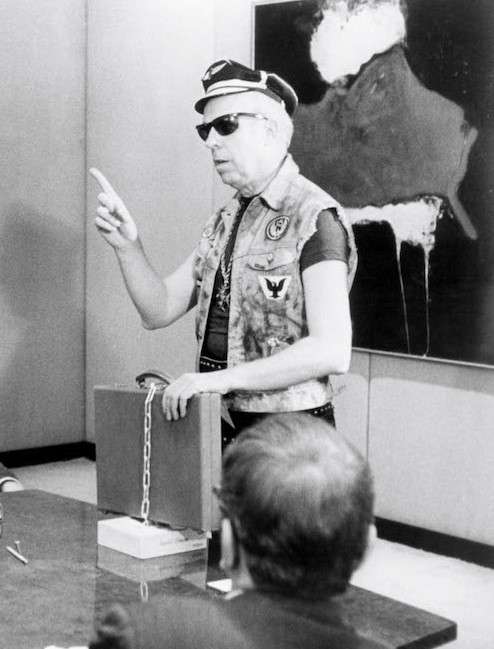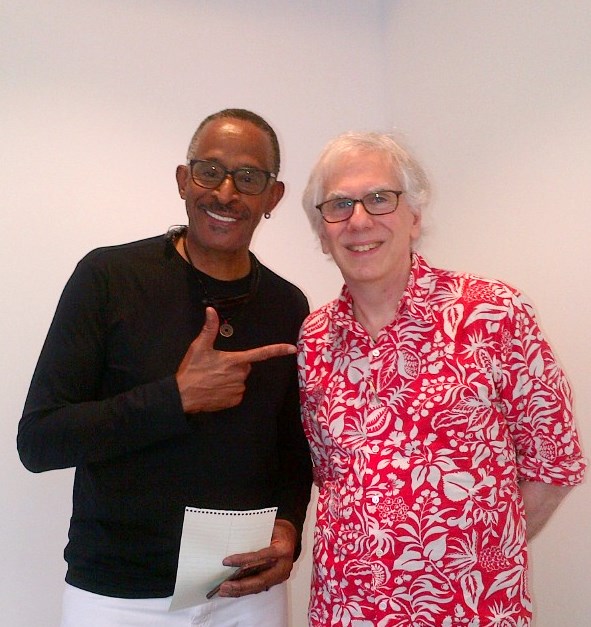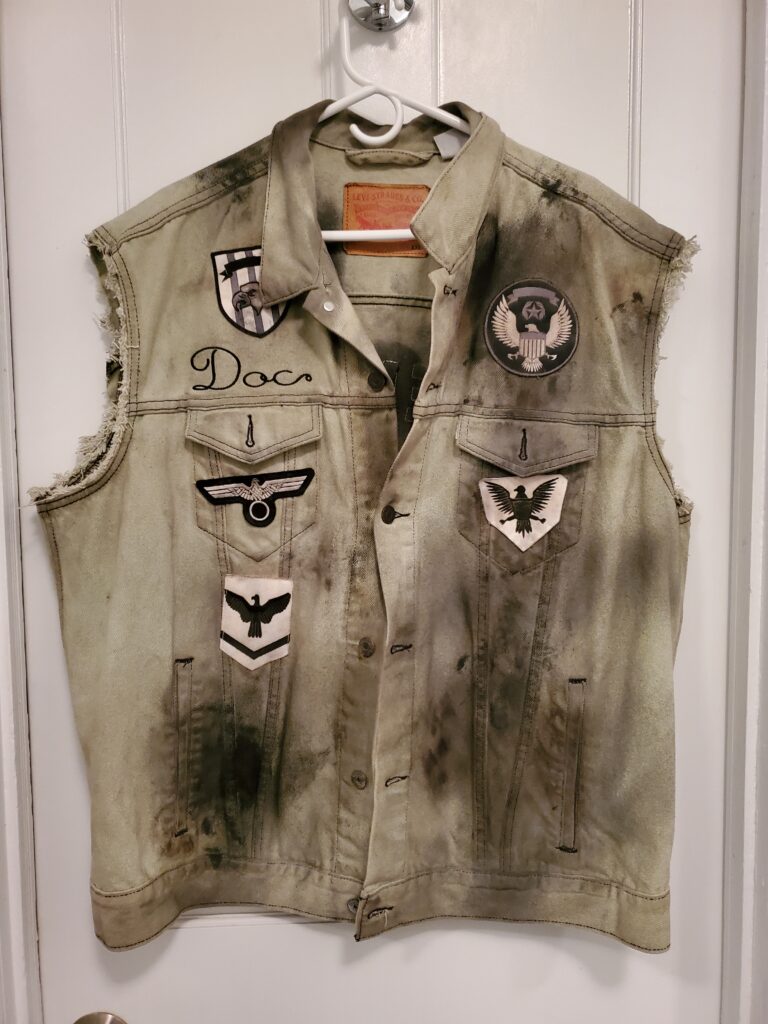By Ira Robbins

Robert Downey entered my life in 1969. For some particular reason long forgotten, Dave, Fred, Barry and I cut high school one afternoon and went to see an underground film called Putney Swope in a theater off Fordham Road in the Bronx. Perhaps the middle finger “Truth & Soul” poster struck a chord; maybe I had read that it was a left-wing satire on racial politics — that would have been a sure deal-maker for me.
However we came to be there, from the B&W film’s opening moments, when Dr. Alvin Weasley hops off a helicopter and delivers his staggering market insight to a board room full of po-faced advertising executives (“Beer is for men who doubt their masculinity. That’s why it’s so popular at sporting events and poker games. On a superficial level…a glass of beer is a cool, soothing beverage. But in reality… a glass of beer is pee-pee dickey.”), we were hooked. The absurdist humor, the brutally funny parodies of TV ads (already a pet peeve of mine), capitalism, politics and racism — all of that, in the parlance of the day, turned me on (as did, I must admit, the nude women bouncing in slow motion in the commercial for the fictional Lucky Airlines). We came out of the theater quoting one of the film’s nonsensical mantras, “How many syllables, Mario?” and referring to the director by his chosen sobriquet: “a prince.”

Not since A Hard Day’s Night had a movie dug that deep into my countercultural consciousness, supplying slang, phrases, images and reassurance that the boundaries of taste and outrage that we were supposed to respect no longer applied. It was Mad magazine come to life, radical politics recast as biting comedy, the aggrieved misanthropy of W.C. Fields brought into the present day.
We made sure to see Putney whenever it played in New York, which it did from time to time. Like our shared fandom for the Who, it became part of a group identity, a secret handshake not known to the world at large. I once brought a portable tape recorder to a showing of Putney at the Thalia and recorded the audio so that we could correctly master the dialogue we loved so much. We incorporated phrases from the film into conversations, dropping lines like Dylan lyrics, amazed at how useful they were in response to all sorts of situations.
- “Rocking the boat’s a drag. What you do is sink the boat!”
- “You gotta know the rules before you can break the rules.”
- “If we use…creative foreplay…before we penetrate…”
- “I’ll do it for nothing, I need the work.” “I can get anybody for nothing. Take a walk.”
- “If I give you a raise, everybody’s gonna want a raise. And if I give them a raise, they’ll still be making more money than you. And we’ll be right back where we started.”
- “Lay some bread on us.”
I have watched Putney Swope dozens and dozens of times. I’ve been to the London suburb of Putney. I’ve met Antonio Fargas, who played “the Arab” in it prior to his better-known role as Huggy Bear in Starsky and Hutch. I’ve shown it to people, not always to much enthusiasm. (For a generation unfamiliar with the film’s era, it’s just one unwoke affront after another, the racial politics — especially the fact that Downey replaced the voice of Arnold Johnson, who played the film’s Black title character, with his own comically gruff voice — too confusing to approve.) I’ve quoted it, discussed it, admired it. There is nothing like it. When Dave Schulps and I started Trouser Press magazine in 1974 and subsequently spent countless hours together in an office, we could and would, with scant prompting, often to the great annoyance of everyone in earshot, recite entire chunks of the film at each other.

A year into our Downey worship, Fred Wasser and I went to see Greaser’s Palace at the Playboy Theater on West 57th Street the day it opened. When we got there, we were shocked to encounter the director himself stood outside. Claiming a personal tradition of refunding the ticket cost of whoever was first on line at his premiere, he gave us back our money. We were awestruck and declared our fandom to him but didn’t get much of a chance to chat. Somewhere around that time, I called in to Barry Gray’s talk show on WMCA-AM and innocently asked Downey, who was his late-night guest, to define ‟jizm,” a word I’d only ever encountered in Putney Swope. That got a laugh.
Throughout his career, Downey was a fearless counterculture swashbuckler, disrespectful of convention and taboos. His first great film, 1967’s Chafed Elbows, is about an incestuous cradle-robber, played by his then wife, Elsie. “At least it’s my own cradle,” she says in her defense. In Pound (1970), a bare-bones film in which actors play caged dogs of various breeds futilely waiting to be adopted, he gave his five-year-old son his first screen line, shyly asking Larry Wolf, a bald actor in a serape playing a Mexican Hairless, if he has hair on his balls.
I kept up with his films and interviewed him by phone when I was working at Video magazine in 1988. But I didn’t get to meet Bob properly until 2001, when my wife Kristina Juzaitis, then employed by Esquire, was able to bring me along to the Lake Placid Film Festival, which the magazine was co-sponsoring, to see him speak on a directors panel. The next day, we came upon him and his wife, Rosemary Rogers, waiting for the train back to the city. I plucked up my courage and introduced myself as a devoted fan. Rather than thanking me and sending me on my way, he seemed genuinely pleased to talk, We ended up sitting across the aisle from each other for the long ride, yakking the whole way home. Before we parted, he said we should stay in touch and appeared to mean it.

Over the next twenty years, we saw each other socially numerous times. I got over my fanboy crush and saw him for the wonderful, generous and outrageously funny man he was, not just the film director I idolized. We went to their apartment, they came to ours. He was an absolute joy to hang out with, an endless fount of wit and knowledge on a wide variety of subjects (film, TV, politics, sports and family being the top five). We went to dinner together; he invited me to watch his nearly finished Rittenhouse Square (2005) documentary in an editing room. We exchanged writing work: I gave him a draft of my first novel, he gave me his script for Forest Hills Bob, an unrealized sequel to Putney, and his treatment for a planned documentary about Lotte Lenya. Rosemary, who became Bob’s third wife in 1998, gave us a copy of The Birthday Book of Saints, co-authored with Sean Kelly. They came to Kris’s first photo exhibition and bought one.
At Bob’s 70th birthday party, I met his son the movie star, who seemed nice enough but not as engaging a character as his larger-than-life namesake. (I’d like to imagine that Bob appreciated my limited curiosity, beyond polite inquiries, about Junior. Unlike people who knew him, if at all, as Iron Man’s dad, my interest in Bob was never about his son. That said, Bob was not shy about sharing his opinions, not all of them favorable, about the films Robert made.)
Then came the decline. It reminded me a lot of my father’s final years, only Bob did it without the paranoia, delusions or rage. At Rosemary’s urging, I visited him during a short stay at a swanky East Side nursing home; we discussed the physical miseries of aging.
She invited Kris and me to come see him one last time at home. It was June 2021, and Parkinson’s was doing its worst. When we arrived, she handed me a folded piece of clothing: an armless denim vest with a Mensa patch on the back. “Bob wants you to have this.” It was the actual costume worn in the first scene of Putney; I was flabbergasted that it had been preserved and even more shocked that she was giving it to me.


Bob was bedridden and a bit foggy, but in good spirits and as warm and generous as ever, mostly able to engage, and we had a nice conversation. At the end of a brief visit, I told him how much his friendship meant to me and that I loved him. A month later, he was gone.
Now there’s “Sr.” (streaming on Netflix). Bob had once mentioned that his son was interviewing him for a film of some sort, but I was unaware until I watched the finished product on Netflix that it had been their enveloping collaborative effort for several pandemic years and had been a miraculous source of energy, inspiration and focus for him.
It is, of course, an enormously welcome gift to spend post-mortal time with a beloved friend, even if only on screen, and the generous inclusion of film clips (adding color to the sumptuous B&W interview footage) is a great way of conveying the flavor of Downey’s oeuvre to those who would likely not be familiar. But it’s not the film I was hoping for. It’s self-indulgent in the nicest possible sense, but it’s hard to imagine who this intimate family portrait is for other than the participants, for whom it must have been therapeutic. But the film-by-film interview with Downey’s dear friend, the director Paul Thomas Anderson, shot for the Criterion Collection in 2012, better conveys the charismatic raconteur I knew and loved. (Anderson also appears in “Sr.”)
Neither the cataclysmic resolution of long-buried parental mistakes, the rediscovery of love between a father and his child or a fully rounded portrait of the director and his work, it is, uniquely, a father-son movie about making a father-son movie, a loving but tentative pas de deux between a cocky superstar who normally doesn’t take shit from anyone and the genial white-haired joker to whom he naturally defers. It’s never clear who’s directing who here; early on, it’s agreed that each man will assemble a film from the footage they are shooting and collecting, but only one ends up with final cut.
There’s no questioning their bond: the tender, intimate film glows with love and is free of recriminations or a relationship in need of repair. (That said, Robert did not interview his older sister Allyson. And while Robert’s two young children appear with him, his adult son Indio, who for a time followed his path into serious drug abuse, is absent.) In their respective homes, father and son proudly display photographs of them together. (When Bob points to one on his apartment wall, that’s Kris’s photo of a Venice fish market at night above it.)
Throughout “Sr.,” while Bob is his opinionated but avuncular self, cracking wry jokes (including the wry citation of a frighteningly prescient line from one of his old films, about “dying of Charlie Parkinson disease,” which he is), chuckling in endless amusement at life and making directorial calls that distill his appreciation for certain mundane sights and sounds, his son – while unfailingly kind, patient, generous and loving in the effort – seems a bit uncertain how to act with the man who raised him, put him in movies (Robert shares a poignant thought about that being a way he found to spend time with his father) and turned him on to pot as an adolescent, a tragic mistake Bob acknowledges in a decades-old interview used here.
Robert, who once recorded a music album that was so self-consciously mannered he seemed to be acting the part of a singer rather than being one, is much more comfortable with his own son Exton, who gets his adoration without visible effort or thought. No acting there. But with his dad there’s a different measure of responsibility, of respect, of consideration not required in parenting a child. He’s dealing with a man who, at various times in his life, got to boss him around, for his own creative ends, in public. In Greaser’s Palace (1972), Robert gets his throat slit and is placed in a shallow grave by his actual mother.
While Bob is calmly running out the clock, enjoying every sandwich, Junior is clearly determined to make a movie. In the late ‘80s and ‘90s, while he squandered stardom as an uncontrollable drug-addled mess sleepwalking through parts (he eventually served serious jail time), Robert enabled his father to make several films by agreeing to appear in them. One of those was Hugo Pool (1997), which Bob made to express the pain of losing his second wife to ALS but also used it to address his recovery and his son’s ongoing problems. Recalling that part of his career, Junior says, “It’s shocking that a single movie came out finished.” In a vintage interview, asked if his boy the movie star still takes direction, Bob takes a beat and says, “Well, he loves fooling around.”
Here, the tables are turned, and it’s the low-key but unpredictable father — a lifetime devotee of arcane self-amusement — who can’t be counted on to say his unscripted lines without improvising something better. When Robert seeks to confirm the film’s proposed title with his dad, Bob agrees, but then says they can probably do better. In a section about Bob’s cocaine era (“fifteen fucking years of total insanity”), Robert ventures, “I think we would be remiss to not discuss its effect on me” and Senior, in a rare moment of reluctance, replies, “Yeah, boy, I could sure love to miss that discussion.”
As the film and its subject near their ends, Robert sits quietly by his bed, a small movie camera silently pointed at his father. As painful as is to watch — it feels intrusively revealing, a deeply personal moment not for public consumption — it’s understandable that a man whose entire life has been recorded on film would choose to document the experience rather than simply endure it. Evidently mistaking his interlocutor for someone else and speaking as if his son were not in the room, Bob asks, “Have you two met before?” Robert, quick-witted, says, “Yeah, we’re getting to know each other.”
Heeding the onscreen advice of his therapist, Robert gingerly asks his father the question that’s been hovering all along. “Is there anything you want your kid to know?” He puts it out there and waits. But it’s too late. Bob replies with a rambling non sequitur and then reaches for a brush and unsteadily combs his hair.
His disappointment assumed but invisible, Junior doesn’t press; in the next scene, accompanied by the sound of Nick Drake, the bed is empty, his father gone. Death-bed confessions and religious epiphanies may make great plot points, but real life runs out on its own terms.
Leave a Reply
You must be logged in to post a comment.